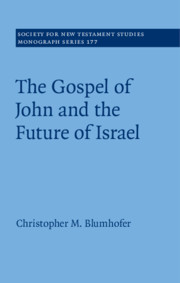Book contents
- The Gospel of John and the Future of Israel
- Society for New Testament Studies
- The Gospel of John and the Future of Israel
- Copyright page
- Dedication
- Contents
- Acknowledgments
- 1 Introduction
- 2 Announcement: John 1–4
- 3 Debate: John 5–10
- 4 Crisis: John 11–20
- 5 Conclusion: Implications for the Interpretation of John
- Select Bibliography
- Index
5 - Conclusion: Implications for the Interpretation of John
Published online by Cambridge University Press: 16 January 2020
- The Gospel of John and the Future of Israel
- Society for New Testament Studies
- The Gospel of John and the Future of Israel
- Copyright page
- Dedication
- Contents
- Acknowledgments
- 1 Introduction
- 2 Announcement: John 1–4
- 3 Debate: John 5–10
- 4 Crisis: John 11–20
- 5 Conclusion: Implications for the Interpretation of John
- Select Bibliography
- Index
Summary
This study has considered the Gospel of John as a historically situated narrative argument about Jesus as the figure through whom the eschatological hopes of Israel are realized. Detailed studies of numerous passages have shown that John’s presentation of Jesus consistently turns to the Scriptures, traditions, ideas, and hopes that were common to Second Temple Judaism and bound up with how that tradition conceived of its eschatological future. John turns to these sources in order to interpret how the particular figure of Jesus embodies the hopes of Israel. By doing this, John shows how continuity between Israel’s storied past and prophesied future becomes available through Jesus. As a gospel (a bios), John’s argument necessarily takes the form of a narrative about Jesus’ life. But the narrative is not an end in itself. It is the vehicle for this incisive, historically rooted argument about who Jesus is.3 The aim of this conclusion is to sketch the interpretive significance of this reading as it relates to three areas of study.
- Type
- Chapter
- Information
- The Gospel of John and the Future of Israel , pp. 212 - 233Publisher: Cambridge University PressPrint publication year: 2019



